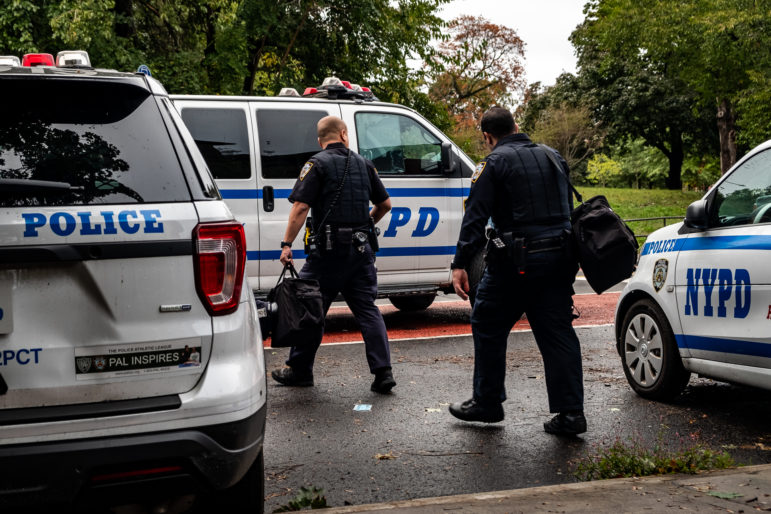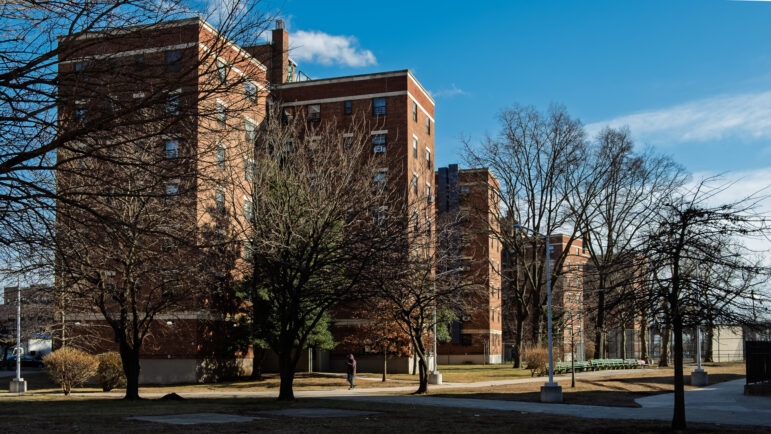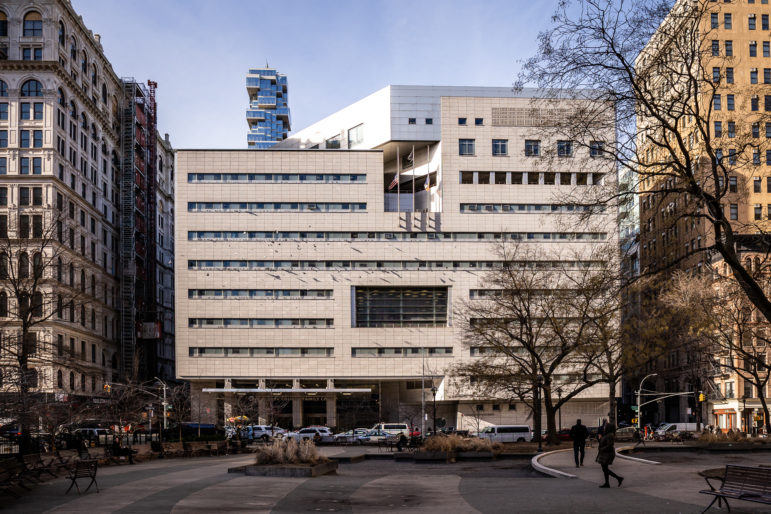“An independent, informed press is an essential check against the police, and it is critical that police radios remain open for journalists to monitor police actions and breaking news events.”

Adi Talwar
Officers of the 52nd Precinct head out on patrol.In July 2015, Daily News photographer Ken Murray heard a call over the police radio about a crime scene in Staten Island. He went to the location where he saw tape marking off the area where NYPD police had killed Eric Garner. Murray was able to locate a witness, Ramsey Orta, who shared the infamous video of the police officer who choked Garner to death.
Access to police radios, a critical tool for newsgathering and police oversight, will no longer be possible if the police get their way: the NYPD has announced plans to encrypt their radios so that third-party scanners can no longer access these communications. Six precincts in Brooklyn have already encrypted their radios, and the NYPD announced plans to encrypt all police radios by the end of 2024.
The New York City Council must take immediate action to block the encryption of police radios and prevent this unilateral action by the NYPD. Encrypting police radios will interfere with journalists and news reporting, harm police oversight efforts by the public, reduce the effectiveness of public safety efforts, and limit city council control over the police. Peaceful protesters also rely on scanners of police radio traffic to avoid police brutality and arbitrary arrests.
Journalists and news organizations listen to police radio traffic to learn about breaking news. This allows reporters and photographers to identify events they can cover in real-time, on location, and provides an invaluable service by informing the public about crucial matters. Encrypting police radios will eliminate this critical resource and make journalists reliant on police sources to learn about newsworthy events.
Like many journalists, Joe DeMaria, who has worked as a photojournalist since 1958, uses police radio traffic to learn about stories to cover. The danger to journalism from encrypting police radios is so severe that the Radio Television Digital News Association labeled this issue its most important for 2023. An independent, informed press is an essential check against the police, and it is critical that police radios remain open for journalists to monitor police actions and breaking news events.
Police radios provide information that keeps people informed and provides public oversight of police actions. While professional journalists monitor police radios, so do members of the public, who can learn valuable information and stay abreast of police activities. During the wave of Black Lives Matter protests in 2020 after the murder of George Floyd, individuals monitoring scanners recorded and archived numerous shocking comments by the police over their radios: NYPD officers responding to protests were overheard on the radio telling each other to “shoot those motherf*ckers” and “run them over.” In 2021, radio traffic captured requests to the NYPD Strategic Response Group (SRG) for assistance with a missing person, which was rejected because the SRG was occupied monitoring a peaceful protest.
Public safety benefits from access to police radio communications, and encrypting these radios will harm the public. During shootings, natural disasters, or other emergencies, police radios provide critical, time-sensitive information which can be disseminated to the public. When a crane collapsed in Hell’s Kitchen last month, police radios provided details that reached the public and helped keep people informed and safe.
Hospitals, first responders, and trained volunteers rely on police radios to stay informed during emergencies and determine the best way to help. In New York, “violence interrupters” respond to crimes to prevent further acts of violence, such as the God Squad, a group of 100 religious leaders who use police radios to learn about incidents where they can show up to work to prevent revenge attacks. Police radios are a crucial safety resource, and allowing the NYPD to encrypt their radios will harm the public.
This drastic change should only be implemented with City Council approval and oversight. While the City Council released a statement calling this change “troubling” and seeking more “transparency,” they should now pass a bill to block this radio encryption plan and roll back the steps already taken in Brooklyn. The NYPD has been stonewalling journalists seeking more information about their encryption plan, and this issue urgently needs City Council oversight and management to keep the radios open and prevent police secrecy and renegade action.
The NYPD has a history of avoiding City Council oversight, most recently when a report from the Office of the Inspector General found the department was violating its obligations under the POST Act to report on changes to surveillance technology practices. The City Council needs to assert its authority and prevent the NYPD from making changes without civilian oversight.
Peaceful protesters rely on scanners with police radio traffic to avoid police brutality and arbitrary arrests. This use of police radios to protect protesters was especially prevalent during the post-George Floyd protests, when police engaged in widespread abuses, leading to the recent $13 million settlement. Organizers used police scanners to monitor deployment of the hyper-militarized Strategic Response Group, learn about attempts to kettle or mass arrest protesters, and ascertain details of NYPD attempts to suppress their marches. Police radio traffic is an essential tool for protesters throughout the city to fight back against NYPD brutality and abuses.
Encrypting NYPD radios is an alarming change that will damage journalism in the city, harm public safety, interfere with public access to police activity, ignore City Council oversight of the NYPD, and remove an essential tool for protesters. The City Council must act to block these plans and require that the NYPD not encrypt any of their radios.
Ratto is a legal intern at the Surveillance Technology Oversight Project (S.T.O.P.) and is currently studying at CUNY School of Law. He has previously worked in campaign politics, non-profits, fundraising, freelance journalism, and political communications.









One thought on “Opinion: City Council Must Act to Keep NYPD Radio Transmissions Public”
Encrypting police radio frequencies is standard practice all over the US. Criminals like burglars and car thieves are often caught with them tuned to the NYPD frequencies. Un-encrypted police frequencies are only an aid to criminals. The public has no right to listen to any emergency services broadcast. Newer government VHF/UHF radio systems are only manufactured with frequency encryption.